
I was immediately enthusiastic. It is exciting. Intelligent. Complex. Stylish. Cinematic. Touching.
In "Secret Boutique", the boutique itself is actually not the main focus, but rather its boss. With what her boutique secretly offer she has made herself irreplaceable for the established upper circles of society .- An eye-catcher: Kim Sun-a as Jenny Jang in always exquisite, stylish fashion and with sunglasses that are extravagant in every lighting condition. She acts mostly calm, controlled, superior, with a poker face and in every situation a suitable solution to the problem.
- A joy: Go Min-si as an intelligent Baduk (Go) player and equal strategist who suddenly stumbles into Jenny Jang's team.
- A ray of hope: The fact that this KDrama lives on the many powerful female leads. Three Jaebeol ladies (!) included. The 'men' here tend to be tame shepherd dogs in the service of 'their' ladies...
I was immediately enthusiastic about "Secret Boutique". The KDrama is exciting. Intelligent. Complex. Stylish in the high-end segment. Often almost cinematic in light, colors, camera and set design. And despite all the sublime arrogance, sophistication and need for (self)control, it is also touching. Human traits are presented not only abysmal. A warming grounding in cordiality comes along with the characters around the Go player Lee Hyeon-ji.
Calling the story of "Secret Boutique" a romance wouldn't be appropriate. Feelings still play an important role - here and there and over there, too. Deep feelings no less. Nothing is shallow here. But primarily I would describe the KDrama as the exciting story of a revenge campaign. A story about the (emotional) price of such a vendetta. In addition, an intriguing story about the unfair, corrupt and criminal machinations of the greedy rich, who unscrupulously go over dead bodies, too. A compassionate story that offers insight into the very particular structure of the Jaebeol empires, which channel their power within the family (at the expense of trust, warmth and closeness). A touching story about love and loyalty. Also about how roles, norms and social structures as well as an ambitious ego hurt your own heart. In addition, the KDrama came up with a profound punchline that takes the Jaebeol worldview to the point of absurdity: the Jaebeol daughters, who are so convinced of their elitist, inherited noblesse and who consider themselves so much more valuable due to their lineage, actually do not have any Jaebeol-blood at all ... "Secret Boutique" portrays all of its drama characters in a complex, multi-faceted and tangibly human way.
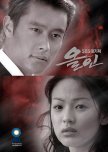
The actors put their heart&soul into it. Soundtrack + camera provide a unique ambience. A Classic.
"All In" is a timeless classic from the early days of KWave. Via main plot and various sidelines involved, you dive into the subculture and parallel world of back room and casino gamblers. In the course of the story, the glitter and glamor of the casino world increasingly take their place, all the way to Las Vegas.Besides the gaming milieu, the series provides insights into the life of simple, poor young people in the late 1990s, which were shaken by the Asian crisis, and offers interesting local color. The well-established KDrama leitmotif 'Orphanage' also has its place here again. Soundtrack and camera capture the action in an atmospheric and impressive manner.
The actors put their heart and soul into it. In the case of "All In" the milieu-specific ambience was supposed to appear as authentic as possible. Therefore, in advance of shooting Lee Byung-hun and Son Hye-gyo (as adults of the main protagonists) went through an intensive training program, including in a casino in Las Vegas: Lee Byung-hun concentrated on virtuosity Card shuffling techniques and the eye dramaturgy of professional players at the gaming table (he won the Grand Prize at the Baeksan Arts Awards that year, as did the drama itself). Song Hye-gyo, on the other hand, was trained as a croupier and not only convinces when she sorts the chips at a breakneck speed.
The opening scene with a helicopter over the Grand Canyon alone is reminiscent of the beginning of a blockbuster à la Tom Cruise or something similar. "All In" isn't just romance, it's also packed with plenty of action, including brawls and gunfights. It's also about friendship among men. As a milieu study of the gamer's world, it's ultimately about gangsters and mafia, too. (Perhaps it is no coincidence that "the godfather" has a guest appearance in the story: it is shown as a movie in the cinema that shaped the youth of the protagonists.) But of course it's also about great love - in the progress of the 24 episodes facing one obstacle after another - it´s makjang after all...
At the time (2003), this KDrama triggered a veritable All-In-Syndrome in South Korea. The filming locations on Jeju Island became a hotspot for fan tourism. The ratings on public television back then are legendary (at around 47 percent).
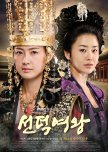
Brilliant. Timeless epic quality of emotionally processing the life of 2 historic heroines
This KDrama tells historical heroine stories for a change. (Yes: female AND plural.) On top of that, enriched along the way with some highly topical insights and a vivid examination of management systems - what does the common people need? How does it want or have to be lead? In this respect, the 2009 series has not lost any of its topicality. But above all, "Queen Seondeok" brings the viewers closer to the earlier (not so well represented in KDrama and KMovie) Korean history of the Three Kingdoms.Here, history is presented in 62 episodes in a moving manner and in dazzling characters, while offering valuable historical input. 62 episodes should not frighten you. This is perhaps more like 5 or 6 seasons western style. You don't have to go through all the episodes in one go, (but you can of course). To be honest, the number of episodes and the rather stiff-looking poster with a heavy crown kept me from watching the series for a long time. But that was a big mistake. This series is wonderful in view of the wealth of impressions, personal processes of the protagonists, and the profound examination of the attitude and philosophy of rulers. Also funny in places. In any case, an impressive piece of Korean history that is told in a round, rich and colorful way. The KDrama leaves nothing out when it comes to being human and being a hero - it presents all of this in various dramaturgical entanglements and depths, with twists & turns and deep feeling. (Swords, bows and battles are also included.)
This is about real historical personalities from Korean history, who made remarkable achievements in their time. First and foremost Queen Seondeok. She was the first Queen of Silla and the first of the few female heads of state in Korean history. If one considers her progressive achievements for her people, she must have been a charismatic personality in order to be able to place herself in the first, officially leading position in this feudal male world. Her life, but also that of other contemporary significant, history-shaping people in her environment are prepared dramaturgically lively and unforgettable. Admittedly enriched with a bit of poetic freedom in the service of a compelling and exciting story. However, in the historical drama orbit, it seems to me quite acceptable to bend the facts here and there in order to create a vivid impression of the character of the historical figures and their work instead. This is much more memorable (in passing) than exact chronologies. In addition, the actual valid sources that can be evaluated are limited. Even historiography has to do a bit of guessing every now and then to understand where, for example, a woman at that time got the vision, the strength and the courage to put men in the second row - and at the same time intelligent, visionary and with respect for the people, to rule in an almost idiosyncratic way.... In my opinion, the fictional plot does not damage the essential impression that one gets about life and challenges in the Silla Reich, about the charisma of the historical personality of Queen Seondeok and the historical figures around her plus her achievements for her people. The KDrama draws a memorable, unforgettable character portrait of the Silla Empire in the 7th century. In doing so, it brings the bones of the queen lying under one of the burial mounds in Gyeongju to life again.
Good to know: The Silla Empire was not yet under the influence of Confucianism, which clearly defines the man as the head of the family/tribe. Among the noble Silla families there were also those in which descent on the mother's side was decisive, or women were considered the heads of the family. At that time, matrilineal and patrilineal tribal structures still existed in parallel. Therefore, the respect for women and their functions in society was comparatively higher overall - but still not a matter of course.
For me, what is valuable about this story (and at the same time the timeless quality of the KDrama) lies in the juxtaposition of two very different, each impressive, intelligent female figures of their time: Princess Deokman (Queen Seondeok) and the noble concubine Misil, who hardly had an influential king or leader of the Hwarang left out during her time in order to directly influence political events. In fact, the two women did not live at the same time, but poetic freedom overrides this and juxtaposes the two as equal antagonists. (Extremely successful!)
The KDrama "Queen Seondeok" is characterized by a timeless epic quality in the emotional processing of the historical events. Brilliantly done in places, quite funny at times, with colorful vividness and everything that life usually entails: plenty of drama that stirs the spirits and also touches the heart. An exciting script (which in the second half has to work through a little more historical facts), and a colorful dance of highly inspired mimes, reviving those distant 50 years in the past 7th century. Not only the later queen and the concubine Misil get a memorable profile, also the men around Queen Seongeok - Bidam and Kim Yushin - are noticeably filled with life. Love story included - it's more of an encore than the main thing when it comes to the entire story, but it refreshes the second half as a balance to the historical ride through time.
By the way, the ratings literally went through the roof at 43.6 percent when the series was broadcast on television in 2009.

More than a classical romance this is about the elite education hype, Gangnam mothers & scandals
"Crash Course in Romance" ... well.Starting with the title, makes me jump right into my criticism. Don´t get me wrong. It doesn't concern the KDrama itself. On the contrary! Yet, this international title business... again I don't know why... (well, I'll probably never understand it...) Why does the international title have to suggest a completely different story? Why does (in this case) Netflix for the international audience want to present something completely different than the tvN (co-)production? Why can't the story announce its story for what it is in the first place? In this case: A KDrama about the one shot scandal involving Gangnam's one shot math teacher. A story about Gangnam rivalries between students, between mothers, between teachers. A story about Gangnam scandals that can easily destroy lives... There is also a love story (or two) on the side, but if you tune in specifically for the romance, you have to see how you´ll deal with what is actually offered. (I would guess that might be a bit disappointing.)
Surely, a romance is brewing, but in fact it's the characters, the story and the context around it that create a substantial with plenty of life of its own – apart from the amorous relationship dynamics. There is something like a criminal case, too. It get´s more and more dramatic. Gripping, even. Overall, as a dramaturgical leitmotif, with a socially critical wink it nonchalantly pokes fun at the recent education hype. At the same time condemns, too. So, in fact, this is something completely different than the title suggests.
I last saw, experienced and appreciated actress Jeon Do-yeon almost 5 years ago in the KMovie "A Man and a Woman". She is not an international superstar, but a nationally respected and recognized actress in film and television. Besides her mostly profound and meaningful play, here she also shows a clownesque, quirky, yet adorable side. She is actually 50 by now. However, here she plays a woman in her 30s. Imagine that. Here (as well as most recently in 2022 in the KDrama "Twenty Five Twenty One", where the main actress, as a 31-year-old, slips into the role of a senior high school student,) it is working. In fact, this gives the characters more lifelike substance, apart from just being 'young and pretty'. At least that's my opinion. Some may be more critical about this casting-philosophy. However, in South Korea it probably bothers less. The number of viewers has exploded over the course of the 16 episodes: from almost 1 million to more than 4 million.
The competitive advantage here, that generally carries this KDrama and sets it apart from the Rom+/-Com of many a style, is substance and grounding that comes with life – a life which is hard enough, for the protagonist at least. She may run light-footedly down the streets and take life's challenges in a sporty manner, but she has also lost some feathers along the way and made severe sacrifices. She´s past her youth by now. But she stands in the middle of a sound and solid life.
The male protagonist, too, has already experienced a lot in his vita, including some unpleasant encounters with life – despite everything he seems to be living in the fast lane at the moment. Among other things, with his stress-related eating disorder, he brings in a topic of the time that is comparatively rarely addressed in series - if only marginally, and certainly not among men. Here the eating disorder is even the hook for the encounter between the two protagonists...
Nevertheless, "Crash Course in Romance" has a upbeat side to it. ...It´s the clown's job to bring some jokes and fun into bitter seriousness – some say that you should be able to laugh about your own life, otherwise you are probably not taking it seriously enough... Others say, you should be more serious about bringing wit and humor to your life… Whichever you prefer, this KDrama here and there contributes to that, while the background against which the plot unfolds is actually peppered with serious jabs at the normal madness of South Korean everyday life in Seoul, south of the river - in Gangnam: The educational stress and pressure to perform among the students, among their mothers, among teaching staff, as well as in tutoring academies. It´s serious stuff. There is stalking vs. MeToo, social media terror, escape tendencies up to suicide, you name it. Bitter seriousness here becomes the hook for plenty of drama. And these dramaturgical stumbling blocks (or rather metal balls in this case) keep getting in the way of two hearts that want to beat faster. Nothing compares to a scandal in Gangnam. That keeps the characters within the story on their toes, and the KDrama audience superbly entertained.
Re.: Romance... yes, there is.
The two of protagonists sort of stumbled into it. That wasn't on the agenda for either of them. Besides they aren't the youngest any more... (Don't worry: for the younger generation among the viewers, the KDrama also offers a touch of amorous teenage vibes in the subplot with the 'daughter' of the protagonist and her two admirers...) In any case, the love story of the protagonists is told with delicacy, sensitively, but humorously, maturely and at the same time chastely. Given the circumstances under which the two protagonists led their lives, this is quite authentic. In general, unnecessary cotton candy is avoided.
As so often, I initially had no idea what to expect from this KDrama – at least there was none of the totally hip superstars and no incredibly new or exciting story. I almost overlooked the KDrama because it's rather inconspicuous. I didn't have high hopes at all. And yet, just because everything seemed so banal about it, it made me curious. It's fascinating how this story was able to wrap me up with its idiosyncratic dramaturgical narrative style. Once again one of those productions that are becoming spectacular in their unspectacular way...
Well, if only it weren't for the title...
…but I already mentioned that at the beginning...

Showing simple normalcy for generations of SK women being gagged&bound by society's endemic sexism
"Kim Ji-young: Born 1982" puts every die-hard Korea fan through their paces: how far does the love for country and culture actually go? The KMovie also does away with any illusion surrounding romanticized and socially idealized yearnings that revolve around the concept of 'in love-engaged-married-happy family'."Kim Ji-young: Born 1982" broke the 2 million mark worldwide as a bestseller (by author Cho Nam-joo). It is also considered the most borrowed book in two consecutive years after publication. The KMovie was also extremely successful. In South Korea, between October 2019 and November 2020 around 3.6 million people went to the movies to watch. In addition, numerous prizes were awarded throughout Asia.
Calmly, unagitatedly and almost objectively distant, the camera focuses on the ordinary life of a typical South Korean woman, wife and mother in her 30s. Actually, she doing quite well. We accompany her in her everyday life between laundry and kindergarten, with her (actually quite attentive, loving) husband, with her in-laws, with her family of origin, with friends, with flashbacks of her childhood and at work, and finally with the therapist. This could all be any live of many a South Korean woman. That's not special at all. It's so cruelly normal that it even hurts. By showing simple normalcy, the story also becomes an outcry for several generations of women gagged and bound by society's endemic sexism.
Gagged and tied up by such a conservative, rigid, discriminatory socialization that is literally burned into flesh, so hardly anybody even considers alternative role models and self-images. There is a lack of role models that give women something like self-love and self-confidence that go beyond identifying with role expectations by family and society. Women somehow grow up as prisoners of those restrictive expectations - in a prison with doors, that technically are not closed, yet in practice barricaded by the mercilessly experienced sexism since early childhood. Accordingly, there is a lack of awareness of human dignity beyond gender roles. For women and men alike. And as we all know, such awareness would be the first path to any change...
In this respect, "Kim Ji-young: Born in 1982" holds up a merciless mirror in a calm, objective and non-judgmental manner, which focuses on the great evil that everyone simply takes for granted. Apparently, around 68 percent of cinemagoers were women. At least, the other 32 percent were men, supposedly.
In one of the last scenes, (which, like all the others in the film, gains its power from the simple, unquestioned und yet unbelievable normality) the underlying emotional muteness is finally allowed to speak up - not loudly and rudely though, but objectively subjectively and, despite all the justified anger, consistently in all modesty calmly, too.
In the face of the spilled coffee, instead of accepting the comments and accusations of her social environment with shame, concern and apologetic words, the FL has her outspoken objections. She eventually stands up for herself... actually, you should think, quite simply, as if it were a matter of course. And yet: downright unheard of. Because: Shameless in the best sense of the word... she no longer lets others shame her for what and who she is. She is slowly but surely developing a somewhat healthy approach to her own self-confidence as a person with self-worth and self-love beyond gender - a person who cannot be reduced by tradition to just a family concerned role concept within a hierarchical society. From this, the FL nurtures a new attitude towards those who traditionally believe they have more value in the social ranking.
Just a comparatively small, handy book; just a two hour movie. The story of Kim Ji-young, born in 1982, has sparked a lot of discussion throughout South Korea. The common, everyday (South Korean) madness shown knows how to touch and quietly infuriate. For me in faraway Germany, too, the KMovie wasn't boring for a minute.
-------------------------------------------------------
--- Outlook ---
'If everyone would act up like that... where would we end up?' - In this sense, the book and the film also led to a horrified outcry within conservative circles in the country. The main actors in the KMovie, for example, had to endure hateful comments for even taking part in it. Just this factual inventory of normal madness of just about every woman in the supposedly modern, innovative South Korea got conservative minds going...
...on the other hand, women affected finally received the balm of cross-class compassion, which for a moment opened up the space for solidary, cross-generational sisterhood. As insignificantly common and simple as Kim Ji-young, born in 1982, may be, the social impact was equally great - the consistently overlooked, completely disregarded reality that has been systematically carried out for countless generations out of principle and tradition, discrimination against (in this specific case) South Korean women.
South Korean society is already shrinking. Earlier than expected. And much faster than expected. No wonder.
Women born in the 1980s by now increasingly began to feel painful about their corsets. A milestone!
Those who were born in the 1990s and 2000s, some among them started to increasingly openly dare to actively shake up the social corset - simply by no longer accepting their 'certain' female role. Another milestone!
However, there is still a long way between shaking up and breaking out or even redefining. Eventually, women can only take this step together with men, who also urgently need to work on their role models, their attitude towards women and a new social self-image. Only then can the shrinking of South Korean society be stopped - a shrinking that, in my eyes, is an expression of a massive imbalance between innovative, turbo-capitalist high-speed in the global fast lane on the one hand, and an ignorant, sexist conservatism on the other, which acts like a lead foot screwed onto the brakes. Nevertheless, growing forces are apparently pushing for an urgently needed, integral, truly progressive transformation of existing values.
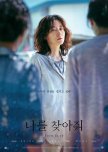
Re. missing children: highly topical, soundly researched, superbly directed and masterfully acted
"Bring Me Home" is a KMovie full of raw reality and emotional impact that disturbingly brings you closer to present day human abyss.Perhaps it would be appropriate to describe this KMovie as a fine study in the nexus between humanity and inhumanity, with the scales being tipped by human compassion. Life becomes barren, cruel, brutal and hopeless when this compassion no longer finds a place among people. But it makes a difference whether a soul has already left the human body and only a cold shell remains, which already lacks any human compassion. Or whether a soul is deeply injured and has only withdrawn far from a dazed body, but at the decisive moment, when human compassion seizes this body and reaches the soul, unexpected energies are mobilized and thus in a kind of holy anger fighting their way out of the pull of gloomy abysses. ...It is compassion that makes a difference in human dignity.
In any case, it is appropriate to describe this KMovie as a highly topical, soundly researched, superbly directed and masterfully acted study about the subject of missing children, or child abduction and child abuse in South Korea.
Howsoever I describe it, the bottom line is the same: "Bring me Back" is a thriller about (in)human abysses. The KMovie unfolds its haunting power through an almost brutal, unimpressed realism, holding up a merciless mirror to a society that seems indifferent to the disappearance of children. "Bring me Back" is a family drama. But it is also rigorous social criticism that explains the particular drama of one (of an alarmingly large number) of South Korean families as a disturbing general social disaster.
Yoo Jae-myung surpasses himself here as dishonest, repellent policeman without shame or sense of duty. Also fantastic: Lee Young-ae. She has already proven herself as an avenging angel in the KMovie "Sympathy for Lady Vengeance". At that time it was about vigilantism as a concept based on principle and planned for a long time. Here it's more of a reflex in the heat of the moment.
Heavy. Gloomy. Still recommendable.
P.S.
Actually, in 2020 (the movie is from 2019) there was a nationwide campaign in South Korea. At that time, 661 children had been missing for more than a year, 638 of them for more than five years. So that they are not forgotten, their faces have now been printed on a wide parcel tape, which is used by the South Korean Post and larger shipping services and can also be used privately. The faces were digitally edited and adjusted to look as they could possibly look today. The central information about their case was also printed on it. (However, I do not know whether this has contributed to the clarification of individual cases yet.)
---------------------------------- SIDE NOTE: --- Missing children in South Korea ---
Human trafficking is not a specifically South Korean issue. However, the continent of Asia is the undisputed leader with 7 countries among the 11 countries with the most victims worldwide. One might not expect South Korea to be at the forefront, but human trafficking is an alarmingly profitable business here, and the trend is expanding - regardless of whether it involves women and children who are exported or imported from abroad, or as Transit country for human traffickers from China or Russia. This is largely beneath the public radar. Public officials are often involved or bribed. In addition, most of the victims here are under the age of 16. This means that they are initially treated 'only' as runaways - this was the case in 80 percent of the solved cases. Thus, the police and authorities are not primarily in charge, but the parents. If the children are among the remaining 20 percent - the kidnapped or abandoned - then unfortunately they are unlucky that they are not searched for with the necessary vigor. At the same time, these minors are among the weakest and most defenseless members of society. They have neither voice, nor life experience, nor strength to really oppose the perpetrators. This makes them easy prey for a lucrative business.
In South Korea, over 99 percent of missing children are found within the first two days. That sounds like a lot. However, for the 1 percent of families who do not find their child during this time span, a nightmare begins that has already driven many parents to even commit suicide. It has been proven that the pain, the struggle with guilt and hope, does not stop in the years and decades that follow.
A figure from 2016: of around 38,000 missing persons reports, half were minors who turned up again within the famous 48 hours. 285 of these missing persons cases could not be cleared up. Among long-term missing minors (according to a 2014 case study), 65 percent were later found dead, and 46 percent of resolved child kidnapping cases revealed they were victims of physical sexual violence.
The statute of limitations marks another problem. As a result, parents often devote their lives to searching on their own, far beyond their means, since no one else will. They however can´t help but keep searching and hoping. They are more likely to lose their job, their social life, their health, or their own life. A 2006 study found that 40 percent of parents who missed their child for years or decades lost their job and spent an average total of around $500,000 in the search. (By now, that sum is likely to be a lot higher.) This includes the money that had to be paid to the number of false informants, or the travel expenses to travel to a potential location where a tip sent the parents. More than once, someone played a prank. Such cases are well documented. But there are also (fortunately) case histories of donors and supporters.
In South Korea, the legal activities relating to missing minors have been tightened again and again in recent years. But the results are still not what one might wish for. A government study from 2021 identifies acute further needs in all areas: from prevention to investigation and prosecution to officials training. Between 2015 and 2020, South Korean women and children were trafficked in increasing numbers. There are always accomplices among public officials, in particular the cooperation between human traffickers and police officers is criticized, which robs the victims of any last hope of help. By the way, in this context, fishing industry on the coasts is also expressly mentioned as a crime scene. Numerous cases of human trafficking and exploitation of workers whose working and living conditions are sometimes disastrous are documented.
------------------------------------------------------------------------------------------

Giant is an epic about the life&love of 3 siblings during highspeed urban development of Gangam
"Giant" offers a dramatically stirring ride through 4 decades of recent South Korean history - 60 episodes tell a touching, upsetting, emotionally stirring and complex story set in the context of a turbo-fast urban development process in Seoul, south of the Han River: Gangnam.In passing, those episodes tell the story when Seoul and its people had to deal with a phenomenal population explosion: in 1953, 1 million people lived in Seoul. In 1960 it was 2.45 million and in 1970 it was already 6 million. Visions and plans were in demand, as were quick practical solutions and investments. Real estate speculation created a veritable gold rush atmosphere. "Giant" is about these 'gold diggers' in particular. (...and this hype about real estate speculation in Gangnam hasn't stopped until today...)
"Giant" is an epic. It is a monument and a memorial to the efforts and sacrifices of many people. The autocratic (and also often corrupt methods) of urban development become comprehensible if one considers them against the background of their time: the military dictatorship, which was inevitably characterized by the powerful influence of persons with military background in political and social decision-making processes (if you like see side note below). Instead of technical arguments and detailed examination, influence, money, bribery and position often had the say at the crucial interfaces.
If you pay a little more attention to the seemingly irrelevant details, "Giant" provides a crash course in recent South Korean history. (If you don't know or care about it, some things might be rather arbitrary or interchangeable.) In any case, the series has reached the South Koreans. In the course of its success, a further 10 episodes were added to the originally planned 50 episodes. For 40 percent of the viewers, "Giant" ranked first at the end of the 60th episode in 2010.
Ok, admittedly, there are 60 episodes. But when the time is right, you can confidently get involved. "Giant" is worth seeing. The story is told in a colorful way and played fantastically. It is emotionally gripping, touching, exciting. We accompany the protagonists over almost half a century: from their childhood in the 1970s to the year 2010. This means that actors can also show what they are made off by playing the protagonists as young. (Today they are stars of the 2020s: Yeo Jing-goo and Kim Soo-hyun). All in all, without exception, everyone delivered a strong performance. Last but not least, villain number 1, Jeong Bo-seok as Jo Pil-yeon, who holds his role brilliantly from the first to the last episode, is vividly remembered with his ice-cold laugh, which never got stuck in his throat - even in the most adverse headwinds.
The KDrama takes a sophisticated approach in telling the historical events and dynamic processes of the time through the eyes and hearts of three siblings. So, we tightly follow these stirring personal processes on the one hand, and several dubious machinations of the (fictitious) masterminds (who are quite close to the real events - see below) on the other. Against the historical background of those decades, in spectacular loopings the dramatically revolving wheel of fortune is allowed to turn to the fullest again and again, emotionally throwing the audience wildly around. KDrama shows it all.
"Giant" offers numerous stirring twists and upsetting turns in matters of love and rivalry, guilt and atonement, revenge and forgiveness. It won't be boring. All this surrounded by an indeed spectacular Gangnam urban development dynamic - at a dizzying high speed from no man's land to the hip trend district - which was not least favored by the autocratic control.
-------------------- SIDE NOTE: --- Gangnam highspeed development thanks to autocratic urban development during military dictatorship ----
There are details of everyday life during the PARK DICTATORSHIP: the influence of the military in all sorts of social issues, the secret service KCIA, which interfered unrestrainedly in domestic political issues and investigations and even used torture to interrogate people. Positions of power, like mayors, being appointed according to their military background and the level of their allegiances with Park. The backroom networks where the places, where the real decisions were made.
There are details of the subsequent DICTATORSHIP under CHUN DO-HWAN: the curfew during the state of emergency under martial law, for example. The brutally crushed democratic aspirations. The establishment of educational concentrations camps - "Giant" refers to the Samchung Camp in Yeoncheon, Gyeonggi, which was set up under the guise of fighting the threat posed by North Korean Communism. In this peculiar concentration camp, at least 60,000, probably even up to 100,000 innocent South Korean citizens were held captive in the former military prison under the most brutal conditions without an arrest warrant. There was talk of 'cleansing'. In fact, it was pure arbitrariness, verging on sadism.
And finally there is TRUE DEMOCRATIZATION of the system after the first free election for a long time - however, sadly, being faced with the same personnel (in autocratic tradition) in decisive ranks.
It has been proven that the military past in many political leadership positions during the Park dictatorship was not accidental but intentional. Among other things, of 6 Seoul mayors of that time (these were appointed, not elected), 3 had a military background. The other three were known for their expressed loyalty to the Park regime. Such people of Park's trust got the chance and used their past, their networks and opportunities as a robust standing, from where they set visionary course for the future of the capital with all means. Otherwise, rarely had the urbanization of Gangnam been as rapid as during those decades.
Gangnam beauty industry, the relevant corporate headquarters of the KPop industry, the suites and penthouses of the richest of the rich in the most exclusive apartment blocks of the country, temples of consumption of numerous luxury brands, hotspots for leisure and culture as well as some of the most prestigious schools contribute to Gangnam's dazzling image today. Gangnam with a population of over 1/2 Million recently is one of the economically most important urban districts of Seoul, in whose towers, which rise ever higher into the city sky, the very large companies of the country have their headquarters. A central transport hub has emerged and even the Ministry of Trade, Industry and Energy has taken political presence here.
It's hard to believe that 60 years ago this district south of the Han River (강 - Gang = river and 남 - Nam = south) stood for flood plains and agriculture - especially cabbage fields and plantations with the Korean Nashi pear. It was an unattractive no man's land, considering you want urban city life.
This had changed in the 1970s after Seoul faced a massive population explosion, the consequences of which the city could not cope with under the given circumstances. Previously, the city's political, economic and cultural heart had been on the north bank of the Han River in Gangbuk - in fact, since the dawn of the Joseon Dynasty. But between 1953 and 1960, in just 7 years, the population had more than doubled, practically 'overnight', from 1 million to 2.45 million. In 1970 it had already reached around 6 million! Nobody had been prepared for this. Chaos was the result. Infrastructure collapsed, slums literally sprouted out of the ground.
That's when the vision of a whole new district south of the river was born. In 1966 it was announced for the first time that the population should be redistributed in the future: 40 percent of the population should live in the northern area, 60 percent in new and densely built Gangnam. A dream in distant clouds, that's how it seemed back then, because there was nothing there at that time.
In the 1970s, the planning took on more concrete forms. Gangnam has been defined as one of Seoul's 3 central urban cores alongside the historical old town and the political center of Yeouido. In order for this to happen, construction of today's Hannam Bridge had already begun in 1966. In 1969 this important connection was completed and the first milestone was reached. Also, the Gyeongbu Expressway was opened in 1970. However, to speed up the development, Gangbuk was deliberately disadvantaged and Gangnam was privileged, for example with tax breaks. An express bus terminal was built, elite schools were relocated and comfortable new apartments were advertised. Stylish urbanity was marketed on one plot, yet rural wasteland was right next to it. The contrasts were enormous.
Yet, residential buildings started to grow at breakneck speed and people began to move to the new southern neighborhoods.
Strictly speaking, Gangnam and the education of an elite school district also marks the beginning of the now enormously profitable private education market and some social excesses, which to this day provide the KDrama market with plenty of material for the most bizarre stories. In addition, speculation in real estate became fashionable and became a new hobby for (more or less) rich wives. Eventually, Gangnam also earned its reputation as an entertainment district, with clubs staying open all night.
The story of Gangnam reads dazzling and spectacular. But the city itself initially had no money for all the investments that were necessary to develop the land. It relied on income from sale of the land set out for recompense from the land readjustment programs. All started slowly, because interested buyers withdrew, disappointed since there was hardly anything really urban in Gangnam in the early 1970s. In order to speed up the processes, a law was passed in 1972 that deliberately relaxed the existing tax regulations relating to property regulations. From then on, profits from real estate speculation were practically tax-free. Trade tax, property tax, etc. were also waived for the next 6 years. This temporary incentive for investors proved extremely successful, but also problematic. This brought speculators onto the scene, who didn't care at all about professional urban development as such.
Thus, remarkable performance comes with sad collateral damage. The catastrophes associated with sloppiness in construction and human fault in the wake of corruption pave the decades just as much as the milestones of urban development. The biggest accidents in this context were, for example, the collapse of the Wawoo residential complex and the Seongsu Bridge. (Others followed at regular intervals. Every decade has its own list...)
Autocratic regulations, the need for speed and the money involved also encouraged flourishing and unchecked corruption regarding insider trading with real estate speculation, building tenders and bidding. Bribery shaped the entire business world. This also promoted a climate in which - if someone was convicted of his illegal activities - he (usually a 'he') was easily released soon later on.
While the giants were able to pocket their gigantic profits without restraint, the population of Gangnam suffered (and still suffers) from housing costs that exceed every measure.
Finally, within this whole developmental process, the lending business has been a crucial and lucrative business since the very beginning until up to date, even if customers and their needs may have changed in the meantime...
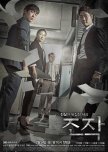
Here the heroes individually are insignificant, helpless. Together they can make a difference.
"Falsify" (also "Distorted") tells an exciting story about the business with official truth. I think this works particularly well as the KDrama offers a critical examination of the rather difficult concept of 'truth', which can be bent and manipulated depending on the eye of the viewer. Is the rule of law just a pretty farce? Rather an eloquent backdrop for the mighty who operate in the shadow? Does actually anything like justice exist? What truth are we hearing? Which one do we want to hear? Which preferably not? Is it always so good to bring the truth to light?Regarding the recently common term 'lying media', used as an accusations from all different directions, "Falsify" offers a burning issue. Also a bit of an 'Watergate Affair' in South Korean garb (as the underlying case resembles some real South Korean one). Sophisticated journalism and sensation-hungry tabloids, public prosecutors and lawyers as law enforcement officers, so called respectable (yet cheating) businessmen as well as gangs are all frighteningly close together. Against this background, seldom has sich wide range of positions, attitudes and motivations been thus successfully intertwined and presented close to touch on the basis of individual fates, altogether mixed up in an exciting story. Abysses open up in view of social ideals and their illusions. And yet hope is not lost in the face of (quite deadly) superiority.
This is definitely not a ´Marvel´-like (super)hero story. Here the 'heroes' individually are insignificant, inconspicuous, fallible, and to some extend helpless puppets in a complex mechanism that is controlled by opaque forces. However, together they can make a difference in co-creation - by bundling their potentials, throwing their prejudices overboard, getting involved with each other, learning to trust each other (despite initial contempt), and no longer reflecting on what separates them. The key is a unifying idea that is bigger than each individual (with their physical, emotional or social needs). They want to give this idea shape, body, weight and charisma with all imaginable creative means. This cross-personal idea is what gives them strength (even in the face of massive personal threats) and overcomes fear. Here it is the idea of a democratic constitutional state in which there is justice for ALL; in which ALL are equal before the law; in which every citizen can/must bear responsibility for his/her actions - the price for the freedom of responsible citizens: a minimum consensus of laws, rights and obligations that are binding and binding for everyone.
This idea sounds nicer and more promising than it really is, because it usually stays with the idea that is trampled on behind the scenes. Yet, it is (real) people who fill this (abstract) idea with life. But where there are people, there are also their corruptibility, their greed, their vulnerability to blackmail and their cowardice, as well as the fitting people to unscrupulously exploit such weak points. South Korea's young democracy and long history of corruption and mighty ones operating in the shadow offers a realistic, scandal-ridden environment to process this exciting and at the same time outrageous KDrama - thus offering a wide range of gray tones, emotionally differentiated and authentic.
By following various protagonists from the press and the courts, the story begins with individual threads of action that are at best loosely connected to one another, but which become entangled over the course of the story and together form a strong strand that everyone can pull on together. So a bit of patience is required from the audience, but it pays off! The differently motivated characters come to life in a tangible way, become comprehensible in good and bad and reveal a reality about the business with truth that makes you shudder. We as the audience are ourselves cleverly integrated as part of the story - as representatives of public opinion and thus as perpetrators and victims at the same time.
Wow!
Good job. Ambitous. Thought-provoking.
P.S.:
Also ideally suited for repeated series enjoyment due to the differentiated, complex story.

High-end KDrama story-telling/performance quality - emotionally complex, captivating, touching.
Society in trouble. "Angry Mom" confronts viewers with some unloved topics. Bullying comes first and keeps the door open for one more... and one more... and one more... and one more... It's about the attitude of the parents when it comes to education and school, about prejudice, discrimination against women, male-dominated hierarchies, pedophilia, the power of the powerful...If it weren't for the comedy (even just the fact that the mother, in her mid-30s, puts on a school uniform again and goes to school), it would all be hard to bear. Also, the protagonist's former school friend was deliberately portrayed in an exaggerated manner. She and the gang of men she leads often look like they're straight out of a cartoon - she herself is sometimes reminiscent of the Red Queen from Alice in Wonderland. Her scenes always provide a breather with a little exaggerated fun, even if the bitter seriousness does not fall by the wayside.
The comedy has nothing to do with a charming blinking. It only serves as a channel for anger and dismay (of the viewers). The story itself isnt´t all too easily digestible. The daughter is being bullied, but no help can be expected from the official authorities. The mother does the work herself (absolutely marvelous: Kim Hee-sun!). Without frills, she stumbles right into a male-dominated snake nest in the high school environment. The further she courageously advances, the more unexpected help she gets. However, no one else would dare for themselves, although many do not like what is going on. ... If she would not be a mother with her child being affected, she would probably have given up too...
This is once again high-end KDrama story-telling/performance quality - emotionally complex, captivating, touching.
Don´t miss it.

A bit weird and edgy, yet refreshingly and unashamedly honest about what love life also is like
"LTNS" (Long Time No Sex) starts off where other series usually end. TVING doesn't care about age ratings. “LTNS” is unusually explicit for a KDrama. At the same time, “LTNS” presents itself as a pitch-black comedy with venomously satirical overtones. Be prepared for an edgy series that is refreshingly and unashamedly honest about what love life also is like...If desire in a relationship has been turned off over time by habit and everyday worries while instead alienation and disinterest are creeping in... what should you do? The protagonists unexpectedly find an almost absurd option to bring some excitement and “we”-time back into their relationship. With detective zeal, they set out to blackmail those in whom the fire of (actually forbidden) desire still burns happily... and in doing so, they thus try to create a (almost criminal) virtue out of their own need, so to speak.
"LTNS" has fun with scenes that convey uninhibited sexuality one moment, but are completely unerotically thwarted the next. It is somehow down to earth in a most peculiar way. Bedroom stories are being told here that we haven´t been waiting for. All of a sudden such a certain mood for certain hours is eventually collapsing like a house of cards due to a mishap or unexpected incident... A "Bravo!" in this context to the actors, too!
“LTNS” promises a special kind of bizarre, weird series delight with plenty of potshots at the mendacity concerning certain facades of a solid and sincere love life and family life that are usually and preferably presented to the outside world.
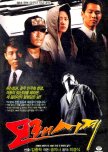
Haunting. Powerful. Taciturn. Unforgettable.
"Sandglass" is a KDrama that relentlessly, sophisticatedly and yet sensitively processes the pain of the South Korean people, that paves the path towards actual democracy. Here you can get a glimpse of a cultural phenomenon: 'Han', a collectively shared sense of painfully experienced injustice (see side note below). "Sandglass" is one of the first KDramas daring to use the medium of television for more than just entertainment. It is also one of the first who could even dare to do so. Here, recent contemporary history is critically targeted from all sides. And at the same time, it becomes a collective vigil for freedom of speech and opinion, for freedom of travel and for the rule of law that have only recently been painfully achieved."Sandglass" tells the story of three young people who were friends during the 1970s and 1980s - Park Tae-soo (Choi Min-soo), who actually would have liked to study but made a career as a thug in gangster milieu, Kang Woo-suk (Park Sang-won ), who hopes for the power of the law and thus studies law, and Yoon Hye-rin (Go Hyun-jung), sort of imprisoned within the golden, solid cage being the daughter of the most influential, officially tolerated casino king in the country, who systematically suplies the government with his money from gambling via anonymous bank accounts. Jumping back and forth in time, the fatal emotional bond between the three is unraveled against the background of social events. It is a dramaturgically conscientious reckoning with the military dictatorship, its abuse of power and its crimes against the people. Original film documents were seamlessly played in, i.e. during the staging of the Gwangju massacre. The presentation of the Samchung re-education camp was also staged as realistically as possible on the basis of original photos and documents. The second half of the story then goes through the destinies of the three protagonists in mafioso style: the gangster, the prosecutor, and the heiress to the casino king. The finale is on the one hand the moment of free election for the people (running in the background), and on the other hand the result of the personal (more or less free) choices of the three protagonists, who still share a world in which despite all recent tumult and uprising basically not much has changed...
More than half of the South Korean population watched the 1995 KDrama "Sandglass". It was praised and praised again. Hard to believe, that it is these days hardly available for streaming with subtitles, never mind as DVD. Apparently, those who have a DVD are reluctant to give it away. I can understand, after I actually saw the KDrama myself - first only in the original version without subtitles (wasn't that bad, because mostly there isn't much talk :-) ), then with a time delay also with subtitles (it was definitely helpful :-) ), and by now also knowing a little more about that historic background. "Sandglass" is truly a masterpiece. Yes, it is taciturn, thrives on the acting, on long shots and on purposefully used, deliberately reduced light. It doesn't sugarcoat anything. It wants to let it sink, each and every moment. The camera accompanies the events almost like a documentary. Without comment, sequences, events, moments in time stand side by side. The story unfolds like a suction and draws you in. The soundtrack supports this pull effect. The story takes its course, the course of which is known, i.e. is predictable: Park dictatorship / suppression of democratic aspirations under the pretext of North Korean infiltration / Chun Doo-hwan supreme military leader, commander of the security and finally new president by coup d´état / martial law, Gwangju Uprising and massacre / cleansing camps / June 1987 fight, abolition of censorship, end of military dictatorship / free elections in 1992. Amazing and grandiose that via TV series a critical review of those bloody 1980s was already possible in 1995. It's brilliant, too, how the protagonists with their very different backgrounds, values and goals are fatally interwoven and mercilessly swallowed up by historical events and social circumstances.
A fantastic K-Drama. Completely consistent. first class.
A sad story. Not funny. Not at all. You have to be able to get involved with the dramaturgically idiosyncratic, taciturn handwriting. (The mood should be right, so to speak.)
(And yes, it's an old ham when it comes to production quality. Screen format, picture and sound quality can hardly keep up with the Netflix era - a digital remastering would definitely be desirable...)
Anyone who is interested in the topic but can't get to the KDrama can grab an impression of the Gwangju massacre in "Youth of May" (2021), or a feeling for the time under military dictatorship and for the concentration camps in "Giant" (2010).
However, if you have the opportunity to see "Sandglass", I recommend that you go for it. Even without historical or socio-cultural interest, KDrama has a lot to offer in terms of impressiveness and melodrama.
------------------ HISTORICAL BACKGROUND INFORMATION -----------------------
Admittedly, being able to classify the historic events, helped for me. E.g. at the beginning there are scenes in which thugs and police bus-wise arrive at a building and disperse the opponent party´s event. This was actually the key historical point, marking the beginning of the massive social unrest, which resulted in actual free elections 13 years later. In fact, it was originally a comparatively small strike in 1979, which took place on the 4th floor of the New Democratic Party's headquarters. Around 200 women, workers at the textile company YH Trading Corporation, protested against the closure of their factory. Unions had no place during Yushin dictatorship, however his sit-in-demonstration was actually almost too minor, to interfere. Nevertheless, the government used the particular context at the opposition party building as a cover for a major anti-opposition operation - 'Operation 101'. Around 1,000 police officers in uniform and civilian gangs of thugs assaulted leading party members and 174 of the demonstrating women workers. Union leader Kim Gyeong-sook died while jumping out of the window.
The civilian thugs (fictional Tae-soo in "Sandglass" being one of them), were subordinate to the main money-provider of the regime (here the casino king and Hye-rin's father, who clean-washed his income for political means.)
That factory workers´ trade union action by no means was the reason for the following uprising. However the occasion served as the momentum for what was to come. Against this background, the later (fictive) encounter between Hye-rin and one of those women from 1979 becomes understandable. Hye-rin adores the by now torture-broken woman for her brave fight for democracy back then. That woman, however, never wanted a political revolt, she just didn't want to lose her job. In fact she feels betrayed and instrumentalized in a political fight that she really didn't want to fight and in which she lost everything, even herself, her dignity and self-respect.
Responsible for the politicization of events that had taken on a dynamic of its own, was actually the Park regime itself: it´s attempt to split and suppress the opposition. By demanding the party leader Kim Young-sam and his deputies to resign from their mandate provoked and politicized the public. Since this coincided with the beginning of the winter semester, the student movement, too, took the incidence for a red-hot political profile: demanding the end of the Park government. A corresponding demonstration in Busan was violently suppressed in this context. A few days later, president Park was assassinated by the head of the Korean Central Intelligence Agency (KCIA). This assassination had nothing to do with the students and their demands. Neither does North Korean Communism. It just coincided timewise with the Busan demonstration. The military, in turn, took advantage of the political power vacuum situation, imposed martial law on the mainland, installed a far-reaching investigative body and thus paved the way for the meteoric rise of Chun Doo-hwan, who was appointed chief investigator. He used his chance consistently and purposefully. After 8 months of military coup, the country had a new dictator in uniform who presented himself as the savior of the nation.
He repreatedly and systematically declared the pro-democracy drive the enemy by spreading conspiracy and infiltration theories about North Korea's ambitions. Press and public were massively manipulated with so-called K-operations (king´s operations) in order to convince the people by the good of military rule. The credo was: the military and Chun Doo-hwan were the only chance to counter the spreading, communist-manipulated unrest, in creating something like order and security. At the same time, the military units were drilled with the so-called Choongjung (True Heart) training for a particularly aggressive and efficient suppression of demonstrations. New paratrooper units were created as special forces. In addition to physical fitness, the training included the development of a strong corps-spirit and the use of massive violence and targeted abuse.
Against this background, the situation among the military units deployed in Gwangju in May 1980 can also become somewhat more understandable. On the one hand, they were brainwashed. On the other hand, to date it has still not really been clarified who gave the orders for the escalating violence in May 1980 - e.g. orders to shoot and the use of paratroopers. Internal ambivalence and irritation was common at all levels of command. But that didn't help. In the end the corps-spirit was more binding and prevailed. In this respect, the executing soldiers, as perpetrators, somehow became victims in those sad May days, too. The proclaimed enemy - North Korean Communism, which is behind the pro-democracy movement - and the unshakable pillar of power - the military dictatorship with all its arrogance - posed such a strong, effective, powerful threat, so that it was so frightening people in uniform (and without) and made them hitting their brothers and sisters indiscriminately (again, after barely three decades). Because someone had chosen Gwangju as the place of the example. And because the sides there had just turned out that way - those who lived in, studied in or visited Gwangju on the one hand, and those who were doing their military service at nearby barracks at the time. On the other hand, the political vision or just a simple wish, that everybody might finally live freely under fair conditions, seemed hopeless. Suddenly the fight was (rather apolitical) about pure survival and desperate rebellion against arbitrary violence.
Eventually, with "Sandglass" the South Korean population became seriously aware of what had really happened in Gwangju in 1980: a people´s uprising against military oppression, being brutally suppressed. Because of the propagandistic K-operations and the censorship (which was repealed only in 1987), knowledge of these events was never really able to spread. Numerous witnesses had deliberately been put into camps or imprisoned. For the television audience in 1995, these street-fighting scenes must have come as a complete shock, not only because they are terrifying in themselves (regardless of where and when), but because they actually had taken place in such brutal manner and in such close proximity completely without their knowledge. In this way, "Sandglass" also became the trigger for nationwide latest history processing. The TV production paved the way for more critical historical scrutiny in the media and also apparently accelerated the course of the trial and sentencing of ex-President Chun Doo-hwan in 1996. He was sentenced to death. (However, on appeal it was turned into a life sentence. His assets, of course, were safely parked, too. He died of cancer in 2021.)
---------------- Side note: --- NATIONAL SECURITY ACT ----
The National Security Law has been in force in South Korea since 1948 - until today. Its primary purpose was to push through anti-communist propaganda and to control or shut down opposing intellectuals, artists, journalists, students etc.. This National Security Act de facto restricts freedom up to this day and ultimately violates the 1948 Universal Declaration of Human Rights and the 1976 International Covenant on Civil and Political Rights, which South Korea had actually ratified. Fatally, it seamlessly continues a relic from the days unter Japanese rule. Several 100,000 people have fallen victim to this law over the past few decades. The verdicts resulted in prison sentences of thirty to forty years, which is among the longest in the world. It has served military dictatorships well, opening the door to arrest and torture countless times. Even after the end of the dictatorship, as late as 1989, obviously an average of 3.3 people each day were arrested, tortured and sentenced to prison under this national security law. To this day, the law is still officially considered constitutional...
--------------- Side note: --- RE-EDUCATION, CLEANSING AND CONCENTRATION CAMPS ---
A unique dubious institution during the Chun Doo-hwan dictatorship were the concentration camps for re-educating unwanted citizens. 25 such camps were set up in the aftermath of the Gwangju massacres. They served to systematically clear the streets of South Korea of unwanted people (and yet mostly arbitrarily as a military demonstration of power). The camps were primarily used for brutal abuse - any dignity was broken, body and soul pushed to the limit.
The detainees were divided into 4 categories: A implied prison; B and C an agonizing time in one of the re-education camps; D a warning. Category B and C inmates often ended up in prison as well, provided they survived the re-education camps. E.g. a former military prison in Yeoncheon, Gyeonggi was thus modified according to 'Samchung Plan No. 5'. This location officially was established to fight North Korean Communism: up to 100,000 innocent people may have gone through hell without a warrant - and rarely enough survived.
--------------- Side note: --- HAN ---
Han can be considered a collectively shared, identity-forming cultural pain in the sense of sad and angry grief. This cultural characteristic developed in the course of Japanese colonization of Joseon. There has been, and still is, debate about the extent to which Han can or cannot be considered a collective trait that creates identity. In any case, as a shared painful experience of that time, a specific form of expression of grief developed, while behind melancholy suppressed anger also resonates. Han has found its very unique solemn, deeply and sadly swinging aesthetic in Korean culture, which we can observe/feel in music, film, television, literature, poetry etc. It can be considered a collectively shared state of mind, that feeds on the traumatic experience of humiliation and abuse as a people that Joseon endured so massively at the hands of the Japanese oppressors. Han addresses helplessness in the face of overwhelming injustice. But despite all the pain and sadness, there is also something tough in Han: an inner resilience, a rebellion, that still provides something like strength in the darkest depths.
Han was further nurtured in the post-Joseon era by the separation of families into two antagonized nations. Finally those brutal 1980s, which are revived in "Sandglass" in the sense of a solidary vigil, tie directly to this collective Han - as a basic feeling that continuously and silently runs through (especially) the first half of the KDrama. A collective emotional state from which one cannot escape: the experience of suffering; the ability of suffering; the national destiny of suffering.
In the course of South Korean turbo-capitalism over the past two decades, Han as an issue has receded somewhat into the background among the younger generation. Nevertheless, there is already a new, modified, less beautiful form of expression: ´Hwabyeong´, the culture-specific Korean manifestation of a depressive psychosomatic disorder with characteristic symptoms, that already affects wide circles - as a result of suppressed anger in the face of overwhelming social circumstances experienced as unfair. (e.g. victims of any sort of bullying in school or at work etc.)
(I wonder, whether it would not be better to continue to give Han an explicit, contemporary, aesthetic expression - in contrast to the embellished, perfected facades e.g. in KPop + KDrama culture... but that would be another topic.. .)
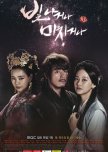
About prince Wang So of Goryeo. A love story with wit, charm & affection. Makjang alert. Toxic, too
First of all: "Shine or Go Crazy" is a love story from head to toe with all the trimmings. Nevertheless, it is also about the dazzling historical figure of Wang So - King Gwangjong from the early hours of the Goryeo era. Thus it is a beautiful character study about the young prince, who at last became king, but who had by far not been the preferred prince of choice as far as the future throne was concerned. How did HE happen to become not only king but such an outstanding one as well - one who is NOT automatically (as so often) a jumping jack for his ministers, eunuchs and palace ladies? Who or what motivated and inspired his rather grounded, almost visionary, innovative, citizen-oriented policies?This KDrama offers a (possible) answer to history, as well as an epic love story, playfully sprinkling disguise of origin and confusion of gender.
----------------- SIDE NOTE: --- Wang So, 4th son of Goryeo King Wang Geon, and later King Gwangjong
During his 26-year reign at the end of the first millennium, King Gwangjong laid solid foundations for the next four centuries. To this end, he introduced some popular reforms for the common people (yet unpopular among the nobility). Above all, these concerned slavery. Additionally he instituted the national civil service exam, which allowed people to serve the country according to their ability. Introduced during his reign, too, were so-called "Daebi-won" - medical centers for the free care of the poor. Finally, he secured the borders of the empire with military measures. Throughout, he consistently had to deal with opponing noblemen ... and eliminated them uncompromisingly. "Shine or Go Crazy" is a dignified multimedia monument to his rulership, that in general rather focused on the needs of his ordinary citizens than aristocracy.
The KDrama "Shine or Go Crazy" (as well as "Moon Lovers" who deals with King Gwangjong, too), offers a conclusive explanation for this King´s particular career. Whether this is historically justified by sources, I could not find out yet. In any case, Prince Wang So becomes tangible and understandable with the help of this fictional setting: The KDramas tell his story as at a young age being banished from the palace and sent to the mountains - thus hopefully avoiding a bloody prophesy from coming true. There he lived a life beyond the palace intrigues, yet close to nature and its existential everyday struggles for survival. Like that, his everyday life inevitably came quite a bit closer to that of the ordinary people of his time. This socialization in 'freedom' and largely grounded normality shaped him in a completely different way than his (numerous) direct and indirect siblings within the palace walls and thus makes him a resolute and popular monarchical free spirit. At the same time, this lays the right foundation for placing a completely unorthodox, unexpected and inspiring commoner´s love at his emotional side. Like that the fictional K-Drama helps to on the one hand understand the sharp edges of his disappointment because of parental rejection as well as his self-doubt due to his curse. On the other hand, however, this is balanced by down-to-earth experience of authentic affection and love. Historically true or not, the extrordinary historic personality of prince Wang So is painted in an impressively tangible, comprehensible way.
------------------- SIDE NOTE --- Trading at the time ---
An aspect of historical detail that's (in general rarely) brought into focus in "Shine or Go Crazy", too, is the importance of thriving international trade at the end of the first millennium. Throughout Korean history, life on the peninsula (not only, but also in KDrama) is rather isolated and self-centered. In this story, at least, business relationships with the immediate neighbors and with the rest of the world are given some space, at least to some extent.
-------------------- SIDE NOTE --- Balhae / Late Balhae
Also rarely a topic in the focus of KDrama is the Korean history BEFORE Goryeo - the time of the three kingdoms Silla, Goguryeo and Baekje. In "Shine or Go Crazy," the female protagonist is a princess from the Late Balhae Kingdom in what is now Manchuria. This dates back to one of five kingdoms that in 37 BC united to form the kingdom of Goguryeo. The first Goryeo King Wang Geon (posthumously Taejo) at his time attempted to reconquer the former territories of the original Goguryeo Empire and thus set his kingdom on proven, solid ground. Balhae being one of them, had previously fallen victim to the Para-Mongolian Kitan. Some (many) Koreans from ancient Goguryeo, who formed the ruling Balhaen elite, escaped to Goryeo - with the crown prince, the nobles and parts of the population. The female lead is set in this context (and also personally associated with an alarming (fictitious) prophecy regarding the future of her people.)
------------------------------------------------------------------------------------------------------------------
Back to the (love) story between the 4th son of Goryeo King Wang Geon and the Balhaean princess, who is an independent prosperous business woman.
In proven KDrama style, there are subplots with their own stories and characters with their own motives, who courageously get involved in the (love) life of Prince Wang So. The political stage is intransigently characterized by malevolent power intrigues. There aren´t any scruples anywhere. Upright people hardly exist, loyalty and dependence being mixed up and confused. There's a lot of bad stuff going on everywhere. It gets pretty ´toxic´, too.
Set in this context is the affectionately and also humourously told relationship of young prince Wang So with a smart, proficient, quite self-confident lady in a double role in disguise as young man. These encounters inspire and enhance Wang So´s pragmatic world view. The dynamic between them is fun to watch - with wit and charm, since his queen of hearts is sometimes hidden behind a veil and sometimes in men's clothes. At times, Wang So has to seriously doubt his gender orientation (... not that this would have deterred him...).
Ah. Yes. The ending... Reviews I had read often blamed the ending. I was ready for the worst. Probably that was a good thing. Like that I was pleasantly surprised as I had expected even worse. In fact, whether I liked it or not, the ending made quite a lot of sense to me. (After all, this is about a historical character - the prince becomes king and has an archetypal task that is greater than himself - during his reign, Gwangjong sets the course for future generations.) Nevertheless, KDrama land even got us a little candy at the very end, too.
My criticism, however, refers to the soundtrack! Unfortunately, this is the first time I definitely have to complain! Shallow songs can have their time, I don´t mind. But in this case (at least in my acustic sound system) as soon as romantic vibes gently started to develop, an inappropriately dull, meaningless song (in my perception) acustically dominated the scene and thus insensitively destroyed each and every moment (again and again). A real shame! (I would like to hope, that this was just due to my technical device...)

A shark may not be able to generate suction, but "Shark" can very well do so !
The title "is an allegory and a leitmotif - be it the original title "Shark" oder the sometimes internationally also used title "Don´t Look Back: The Legend of Orpheus".The latter not only alludes to the ancient legend of Orpheus, but also to Marc Chagall's painting of the same name, which can be found in the KDrama as a leitmotif, too. It basically describes what this is about. As far as the mythology is concerned: Ultimately, Orpheus never gets his great love Eurydice back - even as tries to return with her from the realm of the dead, he unfortunately doesn't manage to do without "looking back" (the condition for the rescue to be successful). In relation to the story of the KDrama, this could mean: the protagonist would have to give up his revenge - his being stuck in the past. And that brings us to the core of the story: revenge.
The original title "Shark" refers to a second leitmotif: Since childhood the protagonist feels a great affinity and sympathy for this particular predatory fish. Ocean sharks must always be on the move. Their mouth remains open so that fresh, oxygen-rich water can reach their gills and they are able to ´breathe´. Not moving means no fresh oxygen supply and thus their certain death. This implies an inevitable activity at all times - consequently they are always dangerous. Ocean sharks are loners, too. At most they join together in groups for hunting. In this respect, the story is set in the world of powerful, highly influential Jaebeol, whose machinations tremendously drive the Wheel of Fortune. They never stop shaping the world at their will, regardless of the cost. The protagonist courageously competes against one of the really big ones (actually against two). There is plenty of manipulation on all sides - as if you were pulling the strings of puppets. Sometimes one might think of vodoo dolls... Police and lawyers are breathlessly chasing behind the events. (It came at a time when bribery and corruption in South Korean business and politics was still more common and taken for granted than nowaydays. It was only a couple of years later that even the head of state was accused of being part of a shocking network controlled by Jaebeol bribery. To that extent the KDrama was just on spot at its time.)
"Shark" offers a fine study about injustice trying to be compensated by vigilantism. However, making amends is not possible. The protagonist's father is and remains dead. Revenge isn't that easy either, because in the course of his chess moves the protagonist stumbles over truths he didn't expect and a love that could get in the way of revenge plans. (Somehow Orpheus is whispering into the protagonist´s ear: "Do not ´look back´!", e.g. let go of revenge and vigilantism...)
The shark (as an animal) may himself not be able to create suction (for breathing), but the KDrama "Shark" can do so very well. The soundtrack sets the rhythm, the melody burns in, the events take their course and you always want to look around the next bend to see what might happen next. Although the good guy is the bad guy, you're feverishly at his side. And on the side of the bad guys, there are the good guys too. What to do with morals...
"Shark" gives practical insight into the early hours of the Jaebeol and their machinations over time. The roles of their long-term companions, who knew them from the earliest hour before their rise as Jaebeol, are also highlighted (e.g. their companions, today assistants, secretaries, drivers, lawyers, etc.). With those they have come a long way and so the know each other, like no other).
"Shark" is more on a tranquil side and maybe less colourful than other KDramas. Both background and heart of this KDrama with its characteristic tinting are set by the tender childhood love - between the Jaebeol´s grand daughter and the driver´s son... The differentiated side plots also keep viewers on their toes. ... It remains thrilling until the end, when open questions are answered.
Mercilessly the wheel of fortune turns, over 20 episodes. The premonitions of the first scenes are set ´today´. Then, in retrospect, the emotional relationship between the protagonists, what happened back then and where they are coming from is portrayed via their youth experiences, before the today´s storyline is picked up again.
Some call this KDrama a masterpiece. I am one of them.
Yet the whole is as often more than its parts. If you are primarily in it for the romance you might be disappointed in the end. Rather against the setting of this love story the KDrama is giving insights into the careers and backdrop of the shiny Jaebeols´ shady practices. In return on this solid drama-soil the emotionally challenging processes of those two ´associated in love´ unfold...
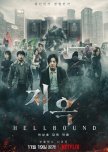
A merciless play with people's fears. Witch-hunt revisited. Gloomy. Upsetting. Horror with no escape
"The Netflix production "Hellbound" started even more successfully on the global streaming platform in November 2021 than "Squid Game". Dystopias (stories about gloomy visions of the future) these days obviously hit a sore spot in the global mass consciousness - the fear of what still is to come, considering that nothing will be the way it used to be....Accordingly, "Hellbound" generally plays with people's fears. The characters in the story also play with people's fears - here in the face of a hell on earth that is spreading inexorably, flanked by a modern form of witch hunts and establishing a new order in which there is little room for hope and light. Because even as a reward for a righteous life, only death awaits in the end. At best, you don´t have to be ashamed and getting ridiculed of it.
The focus for the 'not righteous' is a heavenly or better hellish special commando, which arrives from the afterlife in the form of huge hell gorillas and stages a small earthly hellfire from human bones. No less shocking is the moment that meticulously announces the day and hour of this death in advance.
Rarely have there been so many crazy, delusional people in KDrama (here namely in the realm of the sect). The number of truly honest people can be counted on one hand. And in between there is the vast majority of the terrified masses, blinded and tamed by the New Truth Society's threats sold as hope...
The prospects are really daunting. Not just unearthly prophecy and execution of the death sentence for the shameful, despicable sinners. Even more actually what this scenario does to the people. There is the group of the "arrowhead" who, already sort of detached from any aspect humanity. Their members receive the carte blanche from the ordained sect priests to use the brute force and terror in order to carry out a multimedia-fuelled new edition of witch hunts. They are allowed to live out their wildest violent fantasies . And then there are the would-be ´gentlemen´ (and ´ladies´), CEOs and high priests of the New Truth Society, who submit their new 'commandments' to the people, and the VIPs who solemnly attend the celestial court processes live and in the first row...
Eventually, it can´t get any worse than that. "Hellbound" effortlessly catapulted humanity back into the deepest Middle Ages - yet in the midst of the modern, high-tech 21st century. Business with sin is very popular there. From now on it is no longer about the hope of eternal life (in the hereafter), but merely about not to unnecessarily embarrass yourself as a sinner in the face of the inevitable earthly death...
For me, "Hellbound" is highly ambivalent. It's done great again. Ecellent actors. Exciting story. Upsetting, because maybe not so absurd in terms of social dynamics... But do you really want to/do you have to look at it? There's practically nothing positive coming out of it. Even the hopeful spark at the end remains under a hood of fear and horror and somehow doesn't really find its way back to the light... (A 2nd season is in discussion... maybe then? Or just more fear and horror from which there is no escape?)
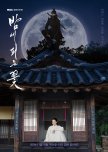
Cheeky, cheerful and heartfelt, drops of suspense included
“Knight Flower” is set in Joseon days, yet it is no epic, historical KDrama in a classical sense. It has endearing comedy to offer, the touch of a romance and even a touch of crime thriller, while the setting back then in Joseon is accounted for predominant neo-Cunfucian social ethics in those days. In particular, back then being widowed was bad news for women, whatsoever. (See side note). This circumstance is providing the hook for a cheeky and fresh-minded KDrama plot.In "Knight Flower", the widow simply cannot get herself to merely spending the rest of her long life in honorable, virtuous seclusion, mostly invisible to the rest of the world, trying not to be too much of a burden to her in-laws, and otherwise mourning the deceased husband (whom she never actually met) in the afterlife.
No, this widow does her own thing. She is not interested in being reduced to the virtue of mourning. During daytime, her everyday life is that of a honorable widow and decent daughter-in-law. Yet, at night she is dressed in black, wearing pants and a mask, climbing over walls, jumping over roofs and helping the poor – as "Midam", a kind of Robin Hood of Joseon. Such is her double life. All goes well, until one day...
While the plot is drawing its dynamic appeal from the actually rather sad background of a dubious tradition of treating widows (not only practiced in old Joseon, and not only back then…), the good news is: "Knight Flower", as a production broadcast in 2024, is built on intelligent emancipation, too. What is called for is not compliant bowing, but rather self-confident, creative solutions in dealing with life. Obviously South Koreans are craving for such a role model these days. The show was quite a success. People there apparently enjoyed it. So did I.
"Knight Flower" is cheeky, cheerful, and heartfelt, drops of suspense included, thus with alluring wit offering an enjoyably entertaining genre-mix.
------------------------------------------------------------
SIDE NOTE: --- Yeolnyeo or Yeolbu, the virtuous woman of Joseon ---
A loyal subject can only serve ONE king and a virtuous woman can only serve ONE husband. This perhaps briefly summarizes the core of the moral teachings of the period between the 14th century and the beginning of the 20th century. Practically speaking, this implied a widowed woman could face death penalty, if she ever wanted to marry again.
Women had to be obedient to their parents and in-laws. They had to honor their husband. And after his death the eldest son had the say... The greatest asset of a woman, besides bearing children, was her virtue. And that was eventually all that was left, if her husband might have died before herself. There was even granted an official award for valuing outstandingly honorable virtuous widows with the reputation of being a Yeolnyeo or Yeolbu. Thus they had to be particularly determined with living as a commendable model wife even after their husband´s death – according to all the rules regarding morals and daily routines as set out in detail in the book about good conduct for virtuous women…
However, the pressure on widows to be respected as Yeolnyeo became excessive over time. At some point it was even common for widows to consequently take their own lives, too, thus expressing their praiseworthy being loyal to the husband until the bitter end. In this way, they could posthumously provide their family (or that of their deceased husband) an honorable glory of virtue in which all family members could bask. Eventually, suicide was even expected of a widow – especially if she became a widow at a young age...


 9
9 38
38 15
15















